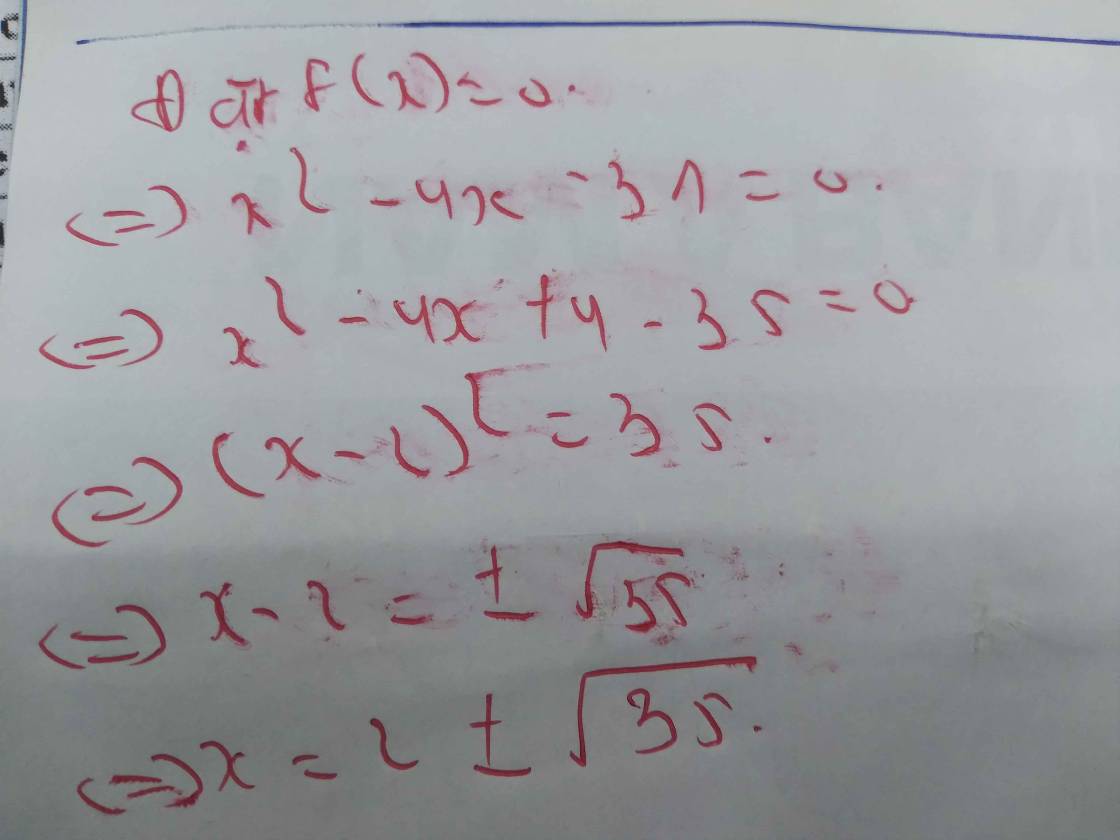
Hãy nhập câu hỏi của bạn vào đây, nếu là tài khoản VIP, bạn sẽ được ưu tiên trả lời.


a/ 3.(2x2 - 4x - 3) - 2.(2x2 - 6x - 9) = 0 => 6x2 - 12x - 9 - 4x2 + 12x + 18 = 0 => 2x2 + 9 = 0 => x2 = -9/2 => vô nghiệm
b/ (3x + 5).(2x - 4) = 0 => 3x + 5 = 0 => x = -5/3
hoặc 2x - 4 = 0 => 2x = 4 => x = 2
Vậy x = -5/3 , x = 2
c/ (x2 - 2x + 2)2 - (x2 - 2x + 2) = 0 => (x2 - 2x + 2).(x2 - 2x + 2 - 1) = 0 => (x2 - 2x + 2).(x2 - 2x + 1) = 0
=> x2 - 2x + 2 = 0 , mà x2 - 2x + 2 > 0 => vô nghiệm
hoặc x2 - 2x + 1 = 0 => (x - 1)2 = 0 => x = 1
Vậy x = 1

a) Ta có: P(x) = 3y + 6 có nghiệm khi
3y + 6 = 0
3y = -6
y = -2
Vậy đa thức P(y) có nghiệm là y = -2.
b) Q(y) = y4 + 2
Ta có: y4 có giá trị lớn hơn hoặc bằng 0 với mọi y
Nên y4 + 2 có giá trị lớn hơn 0 với mọi y
Tức là Q(y) ≠ 0 với mọi y
Vậy Q(y) không có nghiệm.

a) \(8x^3-18x^2+x+6\)
\(=8x^3-16x^2-2x^2+4x-3x+6\)
\(=8x^2\left(x-2\right)-2x\left(x-2\right)-3\left(x-2\right)\)
\(=\left(x-2\right)\left(8x^2-2x-3\right)\)
\(=\left(x-2\right)\left(8x^2-6x+4x-3\right)\)
\(=\left(x-2\right)\left[2x\left(4x-3\right)+\left(4x-3\right)\right]\)
\(=\left(x-2\right)\left(2x+1\right)\left(4x-3\right)\)
=> g(x) có 3 nghiệm là
x-2=0 <=> x=2
2x+1=0 <=> x=-1/2
4x-3=0 <=> x=3/4
vậy đa thức g(x) có nghiệm là x={2;-1/2;3/4}
b) tự làm đi (mk ko bt làm)

1) \(f\left(x\right)=6x^2-15x+4\)
\(\Rightarrow f\left(x\right)=6\left(x^2-\dfrac{5}{3}x\right)+4\)
\(\Rightarrow f\left(x\right)=6\left(x^2-\dfrac{5}{3}x+\dfrac{25}{36}-\dfrac{25}{36}\right)+4\)
\(\Rightarrow f\left(x\right)=6\left(x^2-\dfrac{5}{3}x+\dfrac{25}{36}\right)+4-\dfrac{25}{6}\)
\(\Rightarrow f\left(x\right)=6\left(x-\dfrac{5}{6}\right)^2-\dfrac{1}{6}\ge-\dfrac{1}{6}\left(6\left(x-\dfrac{5}{6}\right)^2\ge0,\forall x\right)\)
\(\Rightarrow GTNN\left(f\left(x\right)\right)=-\dfrac{1}{6}\left(tạix=\dfrac{5}{6}\right)\)
2) \(f\left(x\right)=4x^2-13x+5\)
\(\Rightarrow f\left(x\right)=4\left(x^2-\dfrac{13}{4}x\right)+5\)
\(\Rightarrow f\left(x\right)=4\left(x^2-\dfrac{13}{4}x+\dfrac{169}{64}-\dfrac{169}{64}\right)+5\)
\(\Rightarrow f\left(x\right)=4\left(x^2-\dfrac{13}{4}x+\dfrac{169}{64}\right)+5-\dfrac{169}{16}\)
\(\Rightarrow f\left(x\right)=4\left(x-\dfrac{13}{8}\right)^2-\dfrac{89}{16}\ge-\dfrac{89}{16}\left(4\left(x-\dfrac{13}{8}\right)^2\ge0,\forall x\right)\)
\(\Rightarrow GTNN\left(f\left(x\right)\right)=-\dfrac{89}{16}\left(tạix=\dfrac{13}{8}\right)\)

\(A\left(x\right)=\dfrac{4x^4+81}{2x^2-6x+9}\)
\(=\dfrac{4x^4+36x^2+81-36x^2}{2x^2-6x+9}\)
\(=\dfrac{\left(2x^2+9\right)^2-\left(6x\right)^2}{2x^2+9-6x}\)
\(=\dfrac{\left(2x^2+9+6x\right)\left(2x^2+9-6x\right)}{2x^2+9-6x}\)
\(=2x^2+6x+9\)
=>\(M\left(x\right)=2x^2+6x+9\)
\(=2\left(x^2+3x+\dfrac{9}{2}\right)\)
\(=2\left(x^2+3x+\dfrac{9}{4}+\dfrac{9}{4}\right)\)
\(=2\left(x+\dfrac{3}{2}\right)^2+\dfrac{9}{2}>=\dfrac{9}{2}\forall x\)
Dấu '=' xảy ra khi \(x+\dfrac{3}{2}=0\)
=>\(x=-\dfrac{3}{2}\)

\(x^2+4x+8=0\)
\(\text{Δ}=4^2-4\cdot1\cdot8=-16< 0\)
Do đó: Phương trình vô nghiệm

R= x^2+x+8x+8=(x+8)(x+1)=0
x+8=0 hoặc x+1=0
x=-8 hoặc x=-1
Vậy......
hok tốt